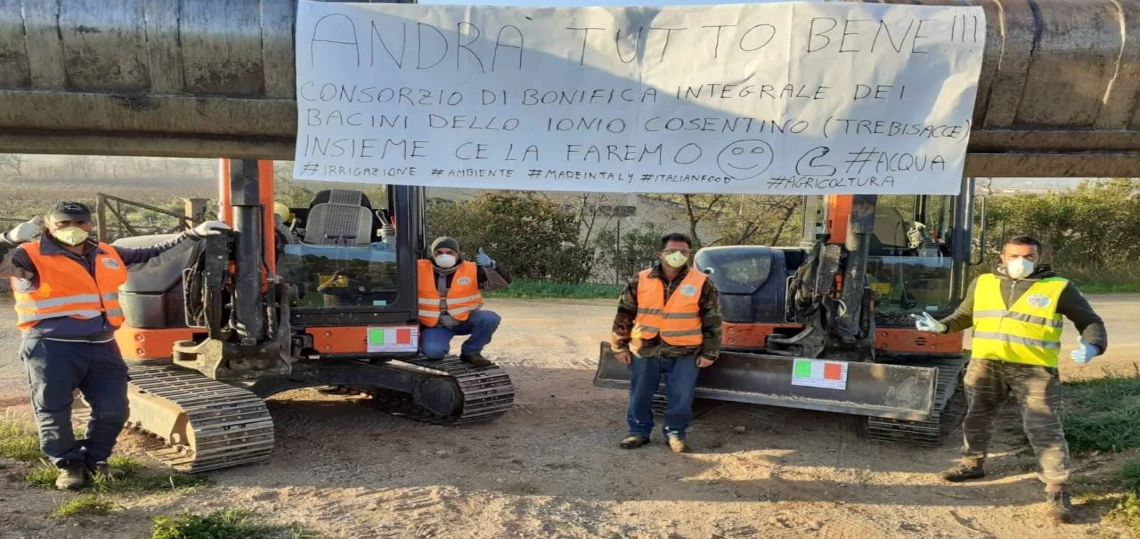 italy-covid 1140x539
italy-covid 1140x539
Every industry, sector, and economy has suffered from the devastating effects of COVID-19. The irrigation and drainage (I&D) sector is no exception, as the pandemic continues to have complex and far-reaching impacts across the water-energy-ecosystem-food nexus. As an enabler of hundreds of millions of agricultural jobs in rural areas, the sector enables the world’s critical production systems, livelihoods for the majority of the world’s poor, and holds the keys to shift to greener recovery.
Irrigation agencies around the world have continued to function despite challenging circumstances. However, there have been multiple shocks impacting service delivery, such as fiscal constraints, interruption of supply chains due to travel restrictions, and lack of availability of labor.
And while global food stocks and prices are currently stable, there are serious concerns over maintaining profitable agricultural production and distribution systems in terms of inputs and services provided. The focus going forward will need to maintain a focus on food security, production, employment, and climate resilience -- areas that are all underpinned by irrigated agriculture.
To spark a discussion on the impact of COVID-19 on the I&D sector and examine ways that the sector can contribute to future economic recovery, the World Bank, the International Commission on Irrigation & Drainage (ICID), and the 2030 Water Resources Group (2030 WRG) hosted a webinar on May 18, 2020. More than 200 irrigation practitioners, including government officials, service providers, private sector representatives, and farmers, gathered online to share and learn from each other’s experiences.
During the session, farmers, private sector and representatives from Indonesia, Australia, India, Italy, Rwanda, South Africa, Mali, Mexico, Dominican Republic, and Argentina presented their challenges in service delivery and the measures they adopted in response. Despite qualifying as essential services during lockdowns in many countries, irrigation agencies are having a difficult time securing equipment, inputs, and maintenance. They also face significant fiscal stress due to additional costs and lower revenues from both state transfers and tariffs.
Across the world, infrastructure work has been suspended and maintenance deferred, which could impact safety and the quality of service delivery. For example, in India, the pre-monsoon activities related to irrigation, such as dam inspection, maintenance, etc., have been interrupted.
Farmers – especially smallholder farmers – have been particularly vulnerable to challenges brought on by the coronavirus pandemic , and several shared their personal experiences during the webinar. For many, the interruption in the supply chain due to travel restrictions has prevented market access for their output. Others noted a lack of accessibility to irrigation equipment and other inputs, as well as a shortage of labor due to reliance on seasonal or temporary migrants. Moreover, with limited access to markets, their revenues have suffered, and many farmers haven’t been able to make payments on their loans to banks.
In some cases, however, recent investments in I&D have boosted employment levels and improved livelihoods. For example, the construction of the Centenario Channel in Mexico has provided direct funds to farmers to produce crops for food security, while also providing employment and vital infrastructure.
Several countries, including Mali and Indonesia, have prioritized irrigation and food production during the pandemic to ensure a stable food supply. The Indonesian government promotes irrigation-based food security through programs such as the revitalization of low-land areas for agricultural crops and cash injections in communities through community contracting.
While the participants of the webinar have all been burdened by new challenges during this unprecedented emergency, many have used the crisis as an opportunity to leverage investments in irrigation and drainage and modernize their systems to tackle this and future shocks. Limited staff availability in the field has also led to the introduction of automated irrigation systems in systems and on farms around the world. And with financial and technical support, small-scale farmers could take advantage of more efficient, automated and affordable irrigation systems, online extension and improved communication between agencies and clients. The ongoing situation has also revealed the need to explore opportunities of selling output online, which could be facilitated by farmer cooperatives, and the need for greater capacity to store produce, which could be supported by post-harvest processing facilities.
Well aware of the climate crisis and the shocks it brings, the need to grow more with less, and the desire to better serve thriving farms, the I&D sector was already in the process of repositioning itself towards modern and sustainable service provision, and the pandemic adds urgency to existing sector transformation needs. This includes the need for a broader strategic approach that includes transforming governance and service provision, supporting watershed management, improving water productivity and efficiency, and an overall greening of the sector through water-smart agriculture.
The pandemic exposed many weaknesses in a fragile sector. However, it has also served to enhance the perceived value of irrigation services due to public concern for food security, rural poverty and overall economic impact. Irrigation practitioners have responded to this crisis with grit and resolve, and will no doubt bounce back stronger.
Related:





Join the Conversation